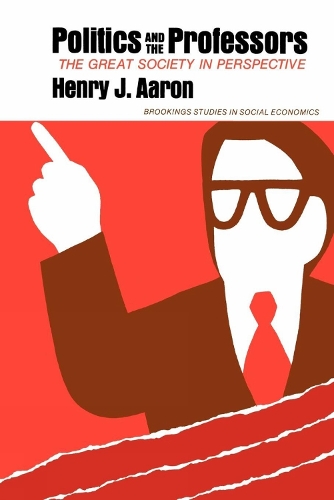
Politics and the Professors: The Great Society in Perspective
(Paperback)
Publishing Details
Politics and the Professors: The Great Society in Perspective
By (Author) Henry Aaron
Bloomsbury Publishing PLC
Brookings Institution
1st February 1978
United States
Classifications
Professional and Scholarly
Non Fiction
Society and culture: general
History of the Americas
Political economy
338.973
Physical Properties
Paperback
200
Width 152mm, Height 229mm
454g
Description
"
In the early 1960s America was in a confident mood and embarked on a series of efforts to solve the problems of poverty, racial discrimination, unemployment, and inequality of educational opportunity. The programs of the Great Society and the War on Poverty were undergirded by a broad consensus about what our problems as a nation were and how we should solve them. But by the early seventies both political and scholarly tides had shifted. Americans were divided and uncertain about what to do abroad, fearful of military inferiority, and pessimistic about the capacity of government to deal affirmatively with domestic problems. A new administration renounced the rhetoric of the Great Society and changed the emphasis of many programs. On the scholarly front, new research called into question the old faiths on which liberal legislation had been based.
In this book, the sixteenth volume in the Brookings series in Social Economics, Henry Aaron describes both the initial consensus and its subsequent decline. He examines the evolution of attitude and pronouncements by scholars and popular writers on the role of the federal government and its capacity to bring about beneficial change in three broad areas: poverty and discrimination, education and training, and unemployment and inflation. He argues that the political eclipse of the Great Society depended more on events external to itwar in Vietnam, dissolution of the civil rights coalition, and, finally, the Watergate scandal and all its repercussionsthan on its intrinsic failings. Aaron concludes that both the initial commitment to use national polices to solve social and economic problems and the subsequent disillusionment of scholars and laymen alike rest largely on preconceptions and faiths that have little to do with research themselves.
"Author Bio
Henry J. Aaron is a senior fellow in Economic Studies at the Brookings Institution, where he holds the Bruce and Virginia MacLaury Chair. Among his many books are Can We Say No The Challenge of Rationing Health Care, with William B. Schwartz and Melissa Cox (Brookings, 2006), and Reforming Medicare: Options,Tradeoffs, and Opportunities, written with Jeanne Lambrew (Brookings, 2008).
